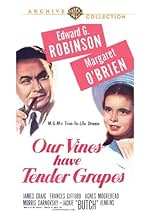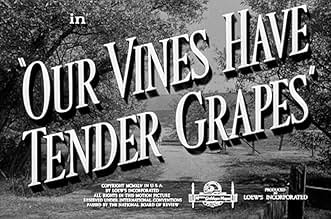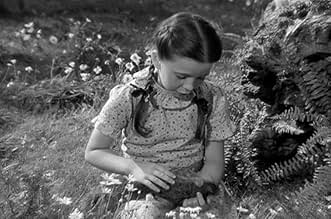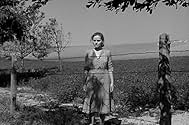IMDb-BEWERTUNG
7,6/10
2524
IHRE BEWERTUNG
Füge eine Handlung in deiner Sprache hinzuA Norwegian farmer lovingly raises his daughter in rural World War II-era Benson Junction, Wisconsin.A Norwegian farmer lovingly raises his daughter in rural World War II-era Benson Junction, Wisconsin.A Norwegian farmer lovingly raises his daughter in rural World War II-era Benson Junction, Wisconsin.
- Regie
- Drehbuch
- Hauptbesetzung
- Auszeichnungen
- 2 wins total
Abigail Adams
- Girl
- (Nicht genannt)
Robert Anderson
- School Boy
- (Nicht genannt)
Empfohlene Bewertungen
I'm normally a pretty sensitive guy but rare is the time, especially with movies these days (I'm in my early 40s), that I feel joy or sorrow or anything at all, for that matter, at a movie. I think most of them are made by people who have nothing to say.
This film is different. I actually found myself a couple times with tears rolling down my cheeks and I was happy to have that feeling. And there were times that my heart soared here too.
I must first say that I have always loved Edward G. From Little Caesar to The Sea Wolf and more, this is an actor's actor. He is authoratative here for sure, but in a tender and fair way. It made me see him in a completely different and more sympathetic light. He is a real "little guy" here. When he balks
at physically punishing his daughter for being selfish with the roller skates, I wish I could make every parent today see that scene.
Strange as it may seem, Agnes Moorehead is an idea match wife for Edward G.
Known for "Bewitched" or Orson Wellesian weirdo-type characters, we usually
see her as kind of a cold loser whose life has passed her by. She is so credible and so good here, you can see a light shine from within. When she expresses
pride in the children, it is real. Robinson and Moorehead are what make this
movie real and are the forces of good who influence children to grow up right.
Now a word about the courtroom scene when the girl offers her calf and
everyone starts offering increasingly valuable parts of the farm to give to the stricken farmer. To say this scene reflected communism is like saying It's a
Wonderful Life reflects communism. It's totally ridiculous. It is Capra-corn of the highest order and is just one of many scenes in a movie performed by people
who believe every word the screenwriter wrote, directed by a person of vision and written with a heart.
So if you are a bit more sentimental and want a film that is real and has a heart, and is far enough removed from all the ADD and ritalin and child abuse we
have now, this one will make you forget about the regrettable way things go
today and the way things should be.
This film is different. I actually found myself a couple times with tears rolling down my cheeks and I was happy to have that feeling. And there were times that my heart soared here too.
I must first say that I have always loved Edward G. From Little Caesar to The Sea Wolf and more, this is an actor's actor. He is authoratative here for sure, but in a tender and fair way. It made me see him in a completely different and more sympathetic light. He is a real "little guy" here. When he balks
at physically punishing his daughter for being selfish with the roller skates, I wish I could make every parent today see that scene.
Strange as it may seem, Agnes Moorehead is an idea match wife for Edward G.
Known for "Bewitched" or Orson Wellesian weirdo-type characters, we usually
see her as kind of a cold loser whose life has passed her by. She is so credible and so good here, you can see a light shine from within. When she expresses
pride in the children, it is real. Robinson and Moorehead are what make this
movie real and are the forces of good who influence children to grow up right.
Now a word about the courtroom scene when the girl offers her calf and
everyone starts offering increasingly valuable parts of the farm to give to the stricken farmer. To say this scene reflected communism is like saying It's a
Wonderful Life reflects communism. It's totally ridiculous. It is Capra-corn of the highest order and is just one of many scenes in a movie performed by people
who believe every word the screenwriter wrote, directed by a person of vision and written with a heart.
So if you are a bit more sentimental and want a film that is real and has a heart, and is far enough removed from all the ADD and ritalin and child abuse we
have now, this one will make you forget about the regrettable way things go
today and the way things should be.
Of course you don't know me, but if you believe that I am the furthest thing from a sentimental person, you should trust me when I say this film (the title of which I cannot even bring myself to reproduce it's such a HORRIBLE title, one of the worst ever) blew me away. This film is like Debussey's music, it flows along and has a spontaneous quality to it, as if it weren't planned at all. The LACK of conflict for at least the first hour is a BOLD move esthetically. It took real guts to make this film, and real skill too. Those who would criticize its lack of "realism," its failure to acknowledge the DARK SIDE know not what they do. We NEED movies which acknowledge the fact that life can be good, that childhood can be fun, that the effortless insights of children make us laugh. I am still laughing at Arnold, who in one scene in the barn bombards Martinius and Selma with "why" after "why" after "why." "Why can't I go to school?" asks Arnold. "Because you're too young," answers Selma. "Why am I too young?" he asks. "Just because you are." "But why?" he asks again. "Because." Maybe it's just me, but that is one hilarious exchange of dialogue, one of many in the film. Margaret O'brien is BRILLIANT in these scenes, astonishingly natural in front of the camera.
Sure there are attempts to get deep about the war, and there are other "literary" moments of forced deepness, but overall this is one RARE piece of film ART, and an unjustly ignored CLASSIC.
Sure there are attempts to get deep about the war, and there are other "literary" moments of forced deepness, but overall this is one RARE piece of film ART, and an unjustly ignored CLASSIC.
Before he got into trouble with the despicable, vicious, self-serving Committee on UnAmerican activities, Dalton Trumbo was a versatile, highly respected, and talented American writer. One of his greatest works (And there were many) was this story called " Our Vines have Tender Grapes. " Directed by Roy Rowland. It tells the story of a small Wisconsin girl named Selma Jacobson (Margaret O'Brien) who's simple Norwegian father (Edward G. Robinson) tries to raise his daughter with kindness and compassion. Life is difficult, but manageable and made so by the simple way of life they live. With his wife Bruna (Agnes Moorehead, before she became Endora on Bewitched) they struggle with life on the farm and with the rural neighbors which dot their small village. Given the enduring and often-times incredible hardships, like floods, fires and natural disasters, their spirits are often tested, but their resolve remains unwavering. Thus the two children learn from their stalwart families, the importance of respect, love and most often the need for understanding the most difficult issues in the world. James Craig plays Nels Halverson. the 'Editor' of the town who's patience pervades the film as he seeks Viola Johnson (Frances Gifford) the new school-teacher and his intended. This film is incredible packed with the true ideals which so many Americans remember as the very fiber of early Americanna. Easily Recommended. ****
This simple story offers sentiment without saccharine in its story of a farming family in a small community. Episodic in nature, the film follows the adventures of daughter Selma (Margaret O'Brien) and her friend Arnold (Jackie "Butch" Jenkins) as they, like the crops under her parents' care, grow into caring, loving individuals.
The cast is the great thing here. O'Brien was a gifted little actress, charming in her prissiness, and Jenkins equals her as her slightly pouty friend. Both offer memorable performances--but the truly remarkable performances here, the ones for which the film should be prized, come from Edward G. Robinson and Agnes Moorehead, who are cast against type in the roles of Selma's parents. Robinson, of course, is best remembered for his tough-guy roles, full of energetic bluster; Moorehead is most often recalled as one of the most memorable shrews in Hollywood history. But both show the range of their talents in this film, playing quietly, simply, and very movingly--and one regrets that both (particularly Moorehead) were not given more opportunity to play such in-depth roles more often.
Ultimately, VINES is about how parents teach their children and shape their lives--and about how children, for good or ill, learn from their parents. Simply filmed, beautifully performed, and memorable from start to finish, it is a film that deserves wider recognition than it normally receives. An excellent family film that both parents and children will enjoy.
Gary F. Taylor, aka GFT, Amazon Reviewer
The cast is the great thing here. O'Brien was a gifted little actress, charming in her prissiness, and Jenkins equals her as her slightly pouty friend. Both offer memorable performances--but the truly remarkable performances here, the ones for which the film should be prized, come from Edward G. Robinson and Agnes Moorehead, who are cast against type in the roles of Selma's parents. Robinson, of course, is best remembered for his tough-guy roles, full of energetic bluster; Moorehead is most often recalled as one of the most memorable shrews in Hollywood history. But both show the range of their talents in this film, playing quietly, simply, and very movingly--and one regrets that both (particularly Moorehead) were not given more opportunity to play such in-depth roles more often.
Ultimately, VINES is about how parents teach their children and shape their lives--and about how children, for good or ill, learn from their parents. Simply filmed, beautifully performed, and memorable from start to finish, it is a film that deserves wider recognition than it normally receives. An excellent family film that both parents and children will enjoy.
Gary F. Taylor, aka GFT, Amazon Reviewer
Sure, maybe the movie harkens back to a simpler time and maybe life really didn't go this way for alot of people, but this is a sweet movie- the likes we don't really see too much of these days. I did find myself waiting for the inevitable "other shoe to drop" as things were really going too well for the main characters and in all movies- something bad usually happens. I have read other comments here regarding this movie and it's supposed communist undertones- if giving of yourself to help someone that lost everything in a fire is communist- then I'm all for it. Edward G Robinson is hard working, sweet and gentle- without being mushy- it's a simple film that is nice to watch for it's wholesomeness. There are some unhappy parts- a barn burning- and a lesson that even when you get something that you have wanted for your whole life, things can be taken away in the blink of an eye. It's a wonderful movie and has alot of the things I watch some classic movies for: a charm and sweetness that involves no sex and violence- it doesn't need to to get it's message across.
Wusstest du schon
- WissenswertesJerry Maren, a member of the Lollipop Guild from Das zauberhafte Land (1939), stood in for Margaret O'Brien in the scene where she is floating down the river in a bathtub.
- PatzerIn the opening scene, during the two-shot of Selma Jacobson and Arnold Hanson, he can be seen mouthing her lines as she says them.
- Zitate
Martinius Jacobson: [Entering Bjornson's new barn] You can still smell the new wood... finest smell on the earth.
- VerbindungenFeatured in A Night at the Movies: Merry Christmas! (2011)
- SoundtracksEntry of the Gladiators
(1897) (uncredited)
Written by Julius Fucík
In the score during the elephant sequence
Top-Auswahl
Melde dich zum Bewerten an und greife auf die Watchlist für personalisierte Empfehlungen zu.
- How long is Our Vines Have Tender Grapes?Powered by Alexa
Details
- Laufzeit1 Stunde 45 Minuten
- Farbe
- Seitenverhältnis
- 1.37 : 1
Zu dieser Seite beitragen
Bearbeitung vorschlagen oder fehlenden Inhalt hinzufügen





































